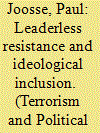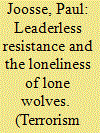| Srl | Item |
| 1 |
ID:
080345


|
|
|
|
|
| Publication |
2007.
|
| Summary/Abstract |
Leaderless resistance is a strategy of opposition that allows for and encourages individuals or small cells to engage in acts of political violence entirely independent of any hierarchy of leadership or network of support. This article examines the development of the leaderless resistance strategy by the radical right and more recently by the radical environmentalist movement. While both movements use leaderless resistance to avoid detection, infiltration, and prosecution by the state, environmental groups like the Earth Liberation Front (ELF) benefit additionally because of the ideological inclusiveness that leaderless resistance fosters. Historically, ideological cleavages have rendered radical environmental groups such as Earth First! less effective than they would have been otherwise. Using leaderless resistance, however, the ELF eliminates all ideology extraneous to the specific cause of halting the degradation of nature. This elimination enables the ELF to mobilize a greater number of "direct actions
|
|
|
|
|
|
|
|
|
|
|
|
|
|
|
|
| 2 |
ID:
152862


|
|
|
|
|
| Summary/Abstract |
“Leaderless resistance” and “lone wolf terrorism” are concepts that have steadily gained importance in the study of oppositional subcultures and terrorist groups, being used to describe the operational realities of a variety of terrorisms, from groups like Al Qaeda to Anders Breivik. In this article, I seek to describe leaderless resistance as a rhetorical construct, a meaning-conferring “ideology of effervescence” that lifts the spirits of both movement progenitors who advocate the strategy as well as incipient lone wolves who consider responding to their exhortations. Through an examination of the case of Wiebo Ludwig and the EnCana pipeline bombings of 2008–2009, I show how these rhetorics emerge in the interactions between activists and their political enemies. With this conception, we can (a) understand more fully the discursive/rhetorical dynamics involved in asymmetrical struggle, (b) problematize the acceptance of the organizational reality of leaderless resistance in the terrorism literature, and (c) question the assertion of some terrorism scholarship that refers to leaderless resistance and other ideologies of effervescence as hallmarks of the “new terrorism.”
|
|
|
|
|
|
|
|
|
|
|
|
|
|
|
|